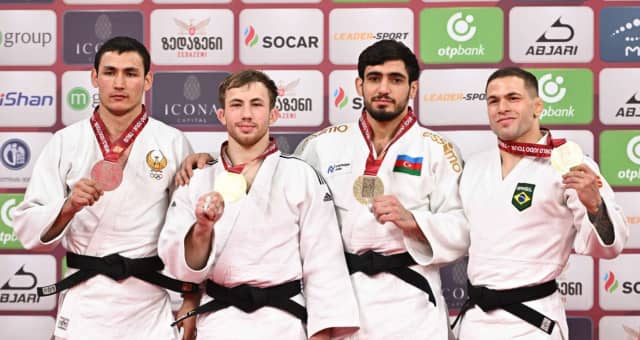For the world champion and Olympic medallist now commentating on JudoTV.com, Neil Adams, the reasons are multiple, but certain main lines emerge, "I think there is a lot of pressure on the shoulders of all athletes and particularly those who arrive highest ranked. All judoka have been competing a lot over the past months. The Olympic qualification has been incredibly exciting and we have reached a point where everyone is a bit tired, which is logical.
The closer we get to the Abu Dhabi World Championships and the Olympic Games, the greater the pressure to perform will become but there will only be one champion per weight category, when we have dozens of judoka who can actually win."
Many competitors are almost qualified. If not officially, they know that they will be in the French Capital this summer. The ones in the top 20, taking into consideration that only one athlete per NOC can go to Paris 2024, are almost sure they will participate. They take each competition as a test, sometimes even as a training session. The result is not the most important objective. "What those athletes can test and try now is crucial," says Adams, before adding, "My colleague Sheldon often says that if you are number one seed and you lose before the final, you must at least make a small save and get to the podium. Once again, the most important part is to try things and be ready for the big rendezvous. When you are a top athlete though, you want to perform anyway and that contributes to the pressure. That, together with the tiredness of this period, and you have many top seeds who lose."
In front of them are athletes who are not 100% sure they will be in Paris. Some are on the continental qualification list and everything can happen. They need wins, they need results and they have that extra-motivation that can make the difference.
The fact is that every single athlete has their own strategy. Matthias Casse of Belgium is a good example of a top athlete who secured his qualification quite early in the season. He attended a lot of events and performed consistently. During his last outings, again he performed and even when exhausted, he was on top, which is remarkable. His last competitions were really a test to meet as many opponents as possible. Catherine Beauchemin-Pinard (CAN) is an other example of consistency, "I saw her so many times reaching the podium. Only recently, I saw her losing as the top seed and this was the sign that she had reached a point where she couldn't maintain it anymore. However, if you take Teddy Riner (FRA); we don't see him often. He chooses his competitions carefully. Last time he fought was in Paris and he won. I think he just wants to reach the top 8 because it can make a big difference this summer. This is maybe what he was lacking in Tokyo three years ago," analyses Neil Adams.
Overall, despite the tiredness, the condition of the athletes is impressive. The last months will be crucial both to train and get ready but also to rest to arrive in Paris not in good shape but in top shape. At the Olympics that makes the difference. There, being the top seed will be a plus but we all know that at the Games everything can happen and everything will happen. Some favourites will win, some will lose, underdogs will emerge and become heroes, everything!



